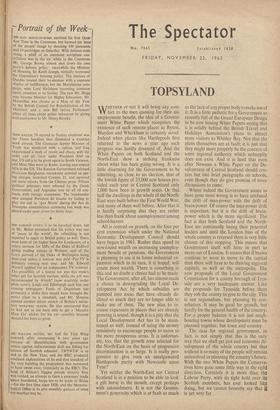TOPSYLAND
NETHER or not it will bring any corn- VV fort to the men queuing for their un- employment benefit, the idea of a Govern- ment White Paper which recognises the existence of such remote places as Ryton, Blaydon and Whickham is certainly novel. Indeed when places like Hartlepools first returned to the news a year ago such progress was hardly dreamed of. And the White Papers on both Scotland and the North-East show a striking frankness about what has been going • wrong. It is a little disarming for the Government to be admitting, so close to an election, that of the lowish figure of 23,000 new houses pro- vided each year in Central Scotland only 2,000 have been• in growth areas. Or that half the dwellings in the whole of the North- East were built before the First World War, and many of them well before. After that it is hardly surprising that they are rather less than frank about unemployment among school-leavers.
All is centred on growth, on the four per cent expansion which under the National Economic Development Council should have begun in 1961. Rather than spend its new-found wealth on increasing unemploy- ment benefit or pensions, the Government is planning to use it to foster industrial ex- pansion which in its turn, it is hoped, will create more wealth. There is something in this and no doubt a choice had to be made. The Government, after all, has almost made a choice in downgrading the Local De- velopment Act by which subsidies are pumped into areas that have already de- clined so much they are no longer able to make use of them. The new plan to in- crease expansion in places that are already growing is sound, though it is a pity that the Local Development Act has to be main, tained as well, instead of using the money sensitively to encourage people to move to the more prosperous areas. It is unfortun- ate, too, that the growth zone selected for the North-East on the basis of progressive discrimination is so large. Is it really pro- gressive to give even an amalgamated Hartlepools parity with Newcastle upon Tyne?
Yet neither the North-EaSt nor Central Scotland is in a position to be able to look a gift horse in the mouth, except perhaps with astonishment. It is not the Govern- ment's generosity which is at fault so much as the lack of any proper body to make use of it. It is a little pathetic for a Government so recently full of the Grand European Design to be now issuing White Papers saying that it is solidly behind the British Travel and Holidays Association's plans to attract more visitors to Whitley Bay. Not that the plans themselves are at fault; it is just that they might more properly be the concern of some regional authority which unhappily does not exist. And it is hard that even after Newsom a White Paper on the De- velopment of Central Scotland should con- tain but two brief paragraphs on schools, even though they do give promise of more discussions to come.
Where indeed the Government seems to have gone most wrong is to have confused the drift of man-power with the drift of brain-power. Of course the man-power drift is important, but it is the drift of brain- power which is the more significant. The fact is that both Scotland and the North- East are continually losing their potential leaders and until the London bias of the whole country is reversed there is very little chance of this stopping. This means that Government itself will have in part to move out of London. It means that if brains continue to want to move to the capital then there will have to be thriving regional capitals, as well as the metropolis. The new proposals of the Local Government Commission for a county borough of Tees- , side are a very inadequate answer. Like the proposals for Tyneside before them they rob the county to give to the city. This is not regionalism, but planning by con- urbation. It may be good for growth, but hardly for the general health of the country.
• For a proper balance it is not just neigh- bouring towns whose development must be planned together, but town and country.
The case for regional government, in fact, is not simply that this is the only way that we shall get just and economic de- velopment of the whole country but that without it so many of the people will remain uninvolved in planning the country's future. With the two White Papers the Conserva- tives have gone some little way in the right direction. Certainly it is more than the Labour Party, with its tight hold over its Scottish members, has ever looked like doing, but we -cannot honestly say that it is yet very far.


































 Previous page
Previous page